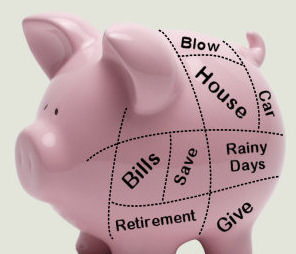 It’s stewardship season in many churches around the country. As my friend Jason Micheli wrote, talking about how much money people give in church is probably even more taboo than endorsing political candidates from the pulpit. As I’ve been thinking about stewardship, I’m convicted by my own bad habits. I think of myself as an easygoing, generous person when it comes to money. There’s one thing I’m not very good at which feels miserly but ironically is a key foundation to pursuing justice through your use of money. I suck at keeping a budget.
It’s stewardship season in many churches around the country. As my friend Jason Micheli wrote, talking about how much money people give in church is probably even more taboo than endorsing political candidates from the pulpit. As I’ve been thinking about stewardship, I’m convicted by my own bad habits. I think of myself as an easygoing, generous person when it comes to money. There’s one thing I’m not very good at which feels miserly but ironically is a key foundation to pursuing justice through your use of money. I suck at keeping a budget.
I remember when I was in my early twenties and worked in various social justice-oriented non-profits, I was very passionate about a lot of causes related to disadvantaged people. But when the offering plate was passed in church, I would pull out my wallet and take out a five or a ten or sometimes a twenty and put it in the plate. I wasn’t earning much money at all, but supposing I averaged $12 or so a week and made about $25k a year, my giving would have been about $624 a year or 2.5%, far below the 10% tithe that is the Biblical standard for giving.
I didn’t have a budget. I just had a general sense that I wanted to be extravagantly generous with homeless people or friends in need whenever the opportunity arose (which was rare) and that I needed to be stingy and live within my means when it came to what I spent on myself (or what I put in an offering plate which doesn’t look at you with puppy dog eyes that melt your heart when it’s asking for money).
Budgets have always seemed like the same kind of thing as those color-coded filing systems that some of the girls in middle school had in their three-ring binders. It seems like something that meticulously organized people do so that they can pinch every penny because they’re too “rigid” to be “generous” and “easygoing” like I am. But the “rigid, ungenerous” people who plan ahead write checks with a calculated amount of their monthly income to put in the offering plate that end up being a lot more than reaching into your wallet and grabbing even a twenty.
I still suck at budgeting, though now that I’m a pastor, I do make sure that one way or another 10% of my income gets into the offering plate (we usually have to play catch-up in December each year). I couldn’t stand the hypocrisy otherwise. At the same time, I have to confess that whenever I get charity solicitations in the mail, I stand by the recycling bin and toss them all in, because I have a general sense that we need to be careful and so it’s easier just to say no to everybody than to have to make decisions about how much of my money I should give to the National Zoo or the farmworker ministry or the Lupus Foundation.
I tell myself I’m saving up so that when somebody “really” needs help, I will have the resources to help them. Or if I discover that God is calling me to start a non-profit. Or of course my kids’ college money. But I don’t have too little money when I decide to buy a $10 sandwich from the local Lebanese cafe because I didn’t plan ahead and buy lunch items in bulk from the grocery store. I don’t have too little money when I want to splurge with a bottle of wine at dinner. I don’t have too little money when it’s time to buy Christmas and birthday presents and I don’t want to look like a cheapskate.
Budgeting has always felt like something I couldn’t just start midstream. Don’t you have to have all your ducks in a row before you start? But it hit me how ridiculous that assumption is. All I have to do is look at my paycheck and divide out 10% for God and other percentages for groceries, kids’ sports, date nights, routine medical costs, etc. I can adjust as I go and figure out what I’m really spending.
So we’re going to start budgeting. Because if we’re planning how we spend our money, then we will have to face constantly the reality of whether or not we are living out our values with our spending. Generosity won’t be as much of a feel-good thing, because it will be calculated instead of a rare gesture of spontaneity. I will have to cut some things out so that I’m saving responsibly also, but I’m no longer going to just think generically that I’m going to save everything I don’t spend so that I don’t have to make any decisions.
It’s a farce to talk about social justice and standing up for the marginalized when you don’t have the discipline to live justly with your spending. Something as banal as making a budget is a critical first step in the journey to living out God’s kingdom. If everyone in the church really did budget 10% of their income for God, there’s no telling what we would be able to accomplish.















